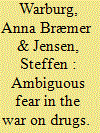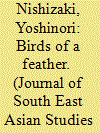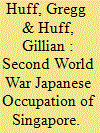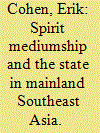|
|
|
Sort Order |
|
|
|
Items / Page
|
|
|
|
|
|
|
| Srl | Item |
| 1 |
ID:
175540


|
|
|
|
|
| Summary/Abstract |
This article explores the social and moral implications of Duterte's war on drugs in a poor, urban neighbourhood in Manila, the Philippines. Drawing on long-term ethnographic fieldwork, surveys, and human rights interventions, the article sheds light on policing practices, social relations, and moral discourses by examining central perspectives of the state police implementing the drug war, of local policing actors engaging with informal policing structures, and of residents dealing with everyday insecurities. It argues that the drug war has produced a climate of ambiguous fear on the ground, which has reconfigured and destabilised social relations between residents and the state as well as among residents. Furthermore, this has led to a number of subordinate moral discourses — centred on social justice, family, and religion — with divergent perceptions on the drug war and the extent to which violence is deemed legitimate.
|
|
|
|
|
|
|
|
|
|
|
|
|
|
|
|
| 2 |
ID:
175549


|
|
|
|
|
| Summary/Abstract |
This article attempts to illuminate Duncan McCargo's influential yet ambiguous concept of ‘network monarchy’ — the source of political power wielded by Thailand's royalist establishment. Drawing on Thai-language primary sources, especially cremation volumes, I argue, first, that many individuals who have made up various institutional components of the network monarchy come from a constellation of traditional royalist families that have intermarried with each other. Contrary to what McCargo suggests, these people are not just bound by their devotion to the monarchy alone, but also by their families’ pervasive intermarriage ties forged over many decades. These ties have given the network monarchy additional resilience, even though not all its members toe the ideological line all the time. My second argument concerns the temporal context in which the network monarchy has come into being. Although McCargo makes it seem that the late King Bhumibol developed the network monarchy — his personal patronage network — as a political tool from scratch in the post-1973 period, it has actually grown, in part, out of the pre-existing elite family networks. I develop these twin arguments by using the case of one royalist prime minister — Anand Panyarachun — as a focal point of analysis.
|
|
|
|
|
|
|
|
|
|
|
|
|
|
|
|
| 3 |
ID:
175547


|
|
|
|
|
| Summary/Abstract |
Confucian revivalism swept over China, the Straits Settlements and the Netherlands East Indies in the late nineteenth century. Rather than perceiving China as the single foundational centre for Confucian ideas, this article argues that pioneering Confucian revivalists who undertook to translate, interpret and spread Confucian knowledge in Java did not simply follow mainstream ideas that prevailed in China, or the lead of the Straits Settlements. Considered as the first Malay language translation of the ‘Great Learning’ and the ‘Doctrine of the Mean’, with accompanying commentaries, Yoe Tjai Siang and Tan Ging Tiong's Kitab Tai Hak–Tiong Iong (1900), contained an eclectic blend of Hokkien/Chinese, Malay, Javanese, Dutch/Christian and Arabic/Islamic concepts and vocabulary. Analysis of the translators’ aims and the work itself, shows that Java's peranakan Chinese initially developed a unique, creolised interpretation of Confucianism, while being connected to other reformers and revivalists in China and the Straits Settlements. As these connections and formal educational exchanges intensified, this creolised interpretation of Confucianism in Java would give way to a more orthodox version.
|
|
|
|
|
|
|
|
|
|
|
|
|
|
|
|
| 4 |
ID:
175546


|
|
|
|
|
| Summary/Abstract |
Identifying the role of colonial-sponsored institutions and written texts produced by local scholars, this article argues that, although Cambodian scholars’ intellectual orientation was not necessarily restricted to French scholarship, French colonial rule had played the key role in introducing modern historiography and creating the platforms for the epistemological transition in Cambodia which underwent different categories of knowledge adoption and various projects of translation of local individuals. Capturing the dynamic of the epistemological transition allows us to highlight a broader picture of the interplay between a long-existing body of knowledge and more contemporary scholarship under Western colonisation.
|
|
|
|
|
|
|
|
|
|
|
|
|
|
|
|
| 5 |
ID:
175542


|
|
|
|
|
| Summary/Abstract |
Based on fieldwork conducted among the Buddhist population living in Rakhine State, Myanmar, between 2005 and 2011, this article elucidates how people deal with health and illness and related uncertainties by relying on a multiplicity of conceptions and practices associated with Buddhism, astrology, spirit cults, as well as indigenous and Western medicine. This article unpacks this plurality to show how different components contribute to the healing process in complementary and yet hierarchical ways which hold to a nexus of political, social, medical, economic, cosmological, biological, and environmental factors. It also questions the boundaries between the religious and medical, Buddhist and non-Buddhist, worldly and otherworldly, and natural and supernatural.
|
|
|
|
|
|
|
|
|
|
|
|
|
|
|
|
| 6 |
ID:
175541


|
|
|
|
|
| Summary/Abstract |
By the 1890s the Dutch had noticed the escalation of opium addiction in colonial Indonesia. They believed that opium consumption had brought about health problems and other negative socioeconomic effects. Yet, the profitability of opium took precedence over its negative social effects in the Dutch East Indies government's policy, which until the end of the 1920s made almost no substantial efforts to address addiction. It was nongovernmental organisations which took the initiative to install medical facilities for addicts and launch diverse anti-opium campaigns. These organisations marked the rise of modern philanthropic activism in the field of public health as part of the flourishing sociopolitical movements of that time. They also represent the nascent civil society in late colonial Indonesia.
|
|
|
|
|
|
|
|
|
|
|
|
|
|
|
|
| 7 |
ID:
175545


|
|
|
|
|
| Summary/Abstract |
Phạm Quỳnh (1893–1945), twentieth century Vietnamese intellectual and politician, is a contentious figure in Vietnamese colonial history in terms of his collaboration with the French administration. Much of the mixed opinions on his role, though gleaned from his essays and political positions, have not yet been connected to the ambiguities of the colonial reforms concurrent with his budding career. Informed by Homi Bhabha's framework of ‘mimicry’, this study offers a reading of Phạm Quỳnh's attachment to language, both tongue and discourse, to nuance his character and reveal the ambiguous articulations of French colonial policy in Vietnam.
|
|
|
|
|
|
|
|
|
|
|
|
|
|
|
|
| 8 |
ID:
175551


|
|
|
|
|
| Summary/Abstract |
The fascinating yet still underexplored world of manuscripts hailing from Southeast Asia, including the nation-state of Indonesia, has received some impetus in recent years, thanks to the new appreciation for this written heritage by state and non-state actors both within and without the country. Traditionally perceived as a dry (and hardly scientific or ‘intellectual’) subject that was the preserve of a small circle of specialist librarians, codicology (and Asian codicology in particular) has become a vibrant discipline, with several teams of scholars and projects worldwide focusing on manuscripts as objects, as well as on ‘manuscript cultures’. These projects and approaches duly recognise the role of manuscripts (and not only texts) as prime carriers of cultural and civilisational values across time and space, as well as their relevance for the culture and identity of contemporary societies. This essay reviews some recent publications on Indonesian manuscripts catering to researchers as well as the wider public.
|
|
|
|
|
|
|
|
|
|
|
|
|
|
|
|
| 9 |
ID:
175550


|
|
|
|
|
| Summary/Abstract |
Japan's Second World War occupation of Singapore was marked by acute shortages of food and basic consumer goods, malnutrition, rampant black markets and social breakdown. We argue that the exploitation of Singapore was extreme and fully accorded with pre-war Japanese policy. Japan used Singapore mainly as a communications centre and port to ship Indonesian oil. Mid-1943 attempts to add manufacturing to the city's role had limited success. Acquiescence of Singaporeans to Japanese rule was a notable aspect of occupation. While part of the explanation is that the occupation was a reign of terror, the economics of shortage conferred on the Japanese considerable leverage in maintaining social control.
|
|
|
|
|
|
|
|
|
|
|
|
|
|
|
|
| 10 |
ID:
175543


|
|
|
|
|
| Summary/Abstract |
This comparative study examines the complex, changing configurations of the relationships between the state and mediumship cults, under different regimes and histories in three Southeast Asian states and China. Spirit mediums are endowed with charismatic authority, owing to their access to the supernatural sphere, which stands in implicit tension with the authority of the state. This tension underlies state–mediumship relationships in Southeast Asia, but leads to diverse dynamics, according to the place of religion in each state. In the atheist, communist/post-communist states (China and Vietnam) mediumship is primarily approached as a political issue; in Buddhist Thailand as a religious issue, and in multicultural Malaysia, where Islam is the official religion, as a legal issue. Tensions prevail particularly in the communist/post-communist states, where there has been a resurgence of mediumship cults, even as these are officially proscribed as ‘superstitions’. In Thailand tensions have been ameliorated by a gradual amalgamation of the cults and popular Buddhism, while in Malaysia tensions are prevented by controls over religious practices. Further research on the relatively neglected issue of the relationship between the state and mediumship cults in the emergent regions of the world is suggested.
|
|
|
|
|
|
|
|
|
|
|
|
|
|
|
|
| 11 |
ID:
175544


|
|
|
|
|
| Summary/Abstract |
This article considers the literary curiosity from the Mạc–Lê dynastic wars in the sixteenth century of a poem written by a Mạc-dynasty partisan being interpreted by later generations as having been written to praise the Lê dynasty. It uses textual and contextual analysis to argue that the poem was written to praise the Mạc dynasty but was later revised by scholars of the Lê dynasty.
|
|
|
|
|
|
|
|
|
|
|
|
|
|
|
|
| 12 |
ID:
175548


|
|
|
|
|
| Summary/Abstract |
A century ago, research on the Malay world was experiencing major breakthroughs on several fronts, but the greatest achievement at the time was without doubt George Coedès’ ‘rediscovery’, based on Asian sources, of a forgotten kingdom named Srivijaya. His book, published in 1918, saw a wave of publications follow in its wake. Sources were trawled in the hope of finding answers to unresolved issues and unidentified place names. Attention invariably also fell on Melaka. In a long article published by the French academic and diplomat Gabriel Ferrand in the same year, the question of Melaka's founding date came under the spotlight. What do the different surviving sources tell us? What about Gaspar Correia's claim that Melaka was a thriving port city for centuries before the arrival of the Portuguese? Was the city — just as in the case of Temasek (Singapore) — known by a different name in earlier times? Ferrand's publication provoked a response from the Dutch academic Gerret Pieter Rouffaer, director of the KITLV. What he planned to be a 20-odd page response to Ferrand swelled into a multifaceted argument running into hundreds of pages. The debate between Ferrand and Rouffaer that touched on Melaka and Temasek-Singapura's early history probably eluded most of their academic contemporaries who were not proficient in both Dutch and French, especially in the English-speaking world. The present article reconstructs the main points of this debate together with their echo in historiography. It makes a contribution to the ongoing discourses, especially in Malaysia, concerning the founding date of Melaka.
|
|
|
|
|
|
|
|
|
|
|
|
|
|
|
|
|
|
|
|
|